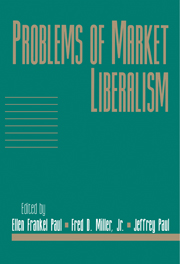Book contents
- Frontmatter
- Contents
- Introduction
- Acknowledgments
- Contributors
- Why All Welfare States (Including Laissez-Faire Ones) Are Unreasonable
- Measuring Opportunity: Toward a Contractarian Measure of Individual Interest
- Deontic Restrictions Are Not Agent-Relative Restrictions
- Why Even Egalitarians Should Favor Market Health Insurance
- Affirmative Action and the Demands of Justice
- The Dual Role of Property Rights in Protecting Broadcast Speech
- Regulation of Foods and Drugs and Libertarian Ideals: Perspectives of a Fellow-Traveler
- Profit: The Concept and Its Moral Features
- Natural Property Rights: Where They Fail
- Toward a Libertarian Theory of Class
- Libertarianism as if (the Other 99 Percent of) People Mattered
- On the Failure of Libertarianism to Capture the Popular Imagination
- Imitations of Libertarian Thought
- Index
Deontic Restrictions Are Not Agent-Relative Restrictions
Published online by Cambridge University Press: 26 January 2010
- Frontmatter
- Contents
- Introduction
- Acknowledgments
- Contributors
- Why All Welfare States (Including Laissez-Faire Ones) Are Unreasonable
- Measuring Opportunity: Toward a Contractarian Measure of Individual Interest
- Deontic Restrictions Are Not Agent-Relative Restrictions
- Why Even Egalitarians Should Favor Market Health Insurance
- Affirmative Action and the Demands of Justice
- The Dual Role of Property Rights in Protecting Broadcast Speech
- Regulation of Foods and Drugs and Libertarian Ideals: Perspectives of a Fellow-Traveler
- Profit: The Concept and Its Moral Features
- Natural Property Rights: Where They Fail
- Toward a Libertarian Theory of Class
- Libertarianism as if (the Other 99 Percent of) People Mattered
- On the Failure of Libertarianism to Capture the Popular Imagination
- Imitations of Libertarian Thought
- Index
Summary
INTRODUCTION
The primary purpose of this essay is to offer a critique of a particular program within moral and political philosophy. This program can be stated quite succinctly. It is to account for agents' being subject to deontic restrictions on the basis of their possession of agent-relative reasons for acting in accordance with those restrictions. Needless to say, the statement of this program requires some further explication. Specifically, two claims require explanation: (1) the reasons individuals have for or against engaging in particular actions are, at least to a very significant extent, agent-relative rather than agent-neutral; and (2) agents' conduct toward others is subject to deontic restrictions. Finally, (3) I need to explain why an agent's possession of agent-relative reasons for performing or refraining from certain actions may be thought to explain that agent's being subject to certain deontic restrictions.
To explicate the idea of agent-relative reasons and the contrasting idea of agent-neutral reasons, let us begin with the closely related ideas of agent-relative and agent-neutral value. If a certain condition has agent-relative value, the value of that condition is its value for some particular agent who stands in some special relation to that condition. If, for example, the value of a given agent's integrity is agent-relative, the value of that condition is its value for the agent whose integrity it is. Because the value of the integrity is its value for this particular agent, that value as such provides only the agent for whom it obtains with reason–agent-relative reason–to promote that condition.
- Type
- Chapter
- Information
- Problems of Market Liberalism , pp. 61 - 83Publisher: Cambridge University PressPrint publication year: 1998



